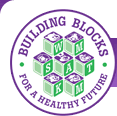
| Brought to you by the US Department of Health and Human Services, Substance Abuse & Mental health Services Administration |
 |
Home  About Us About Us  Links Links  Get E-mail Updates Get E-mail Updates  Awards Awards |
 |
|||
|
|
|||||
| Send this page to a friend | Print this page |  |
||||
|
|
 |
 
Responsibility in the ClassroomOne of the most important lessons a child learns in preschool and kindergarten is responsible behavior: following rules, finishing tasks, and accepting consequences. PurposeTo help students take on responsibility and understand the consequences when a task is not completed. Materials
PreparationPrint out the Know Kit Cards and scatter them in the center of the classroom. ProcedureHave students discuss ways the Building Blocks' friends show responsibility. Invite students to take turns selecting a card that illustrates how one of the friends demonstrates responsibility. For each card selected, students should describe what is shown and how it demonstrates responsibility. For example:
Have the class make a list of responsibilities they have at school and/or at home. For each task listed, have students talk about what happens if the job is not done. For example:
Teaching Note: If you don’t already have a "jobs list," create one for classroom tasks. For example:
As a class, select a task and work through a sequence of "what ifs" that might occur if someone doesn’t take responsibility and complete the task. For example: If I don’t put away the glue, then it will dry out. Related Family Article: Rules and Responsible Behavior Resources:
Please note—to view documents in PDF format, you must have Adobe’s free Acrobat Reader software. If you do not already have this software installed on your computer, please download it from Adobe's Web site. |
||||||||||||||||||||||||||||||||||
| Site Map | Contact Us | FAQ | Ask SAMHSA | Privacy Policy | Web Site Policies | FOIA | USA.gov | Plain Language |
|
Updated on 3/21/2012 |